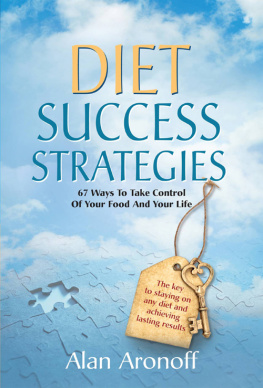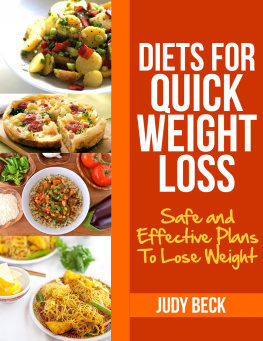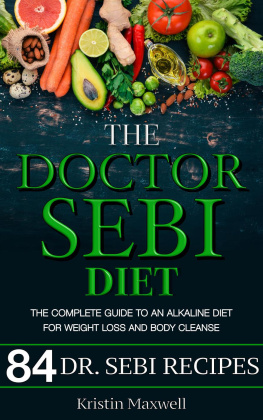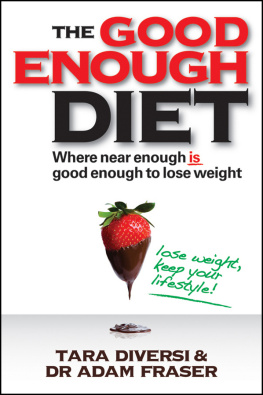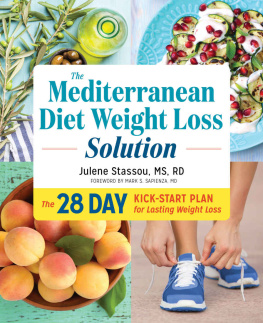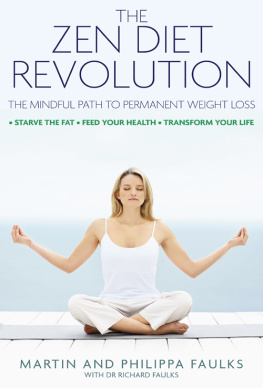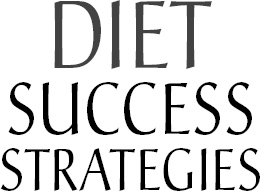67 Ways To Take Control Of Your Food And Your Life
The key to staying on any diet and achieving lasting results
Alan Aronoff
Diet Success Strategies
67 ways to take Control of Your food and Your Life
Alan Aronoff
Copyright 2012 by Alan Aronoff. All rights reserved. No part of this publication may be reproduced, distributed, or transmitted in any form or by any means, including photocopying, recording, or other electronic or mechanical methods, without the prior written permission of the publisher, except in the case of brief quotations embodied in critical reviews and certain other noncommercial uses permitted by copyright law. For permission requests write to the publisher at the address below.
JSA Communications, Inc.
P.O. Box 503
Pomona, N.Y. 10970-0503
www.jsacommunications.net
Ordering Information
For individual sales, or discounts available on quantity purchases by corporations, associations, or others, contact the publisher at the address above.
ISBN: 978-0-615-54407-6
Printed in the United States of America
Library of Congress Cataloging-in-Publication Data
Library of Congress Control Number: 2011942258
Aronoff, Alan
Diet Success Strategies: 67 Ways to take control of your food and your life / Alan Aronoff
Book Design: Karrie Ross www.KarrieRoss.com
Dedication
This book is dedicated to my friend of over 30 years, Byron Dormire. As my kidney donor, his kind and selfless gift changed my life forever.
A Note to Reader
The purpose of this book is to offer suggestions and strategies that will help people achieve their dietary goals. This book is not intended to offer medical or psychological advice and is for informational purposes only. Anyone who thinks that they may have an eating disorder should seek help from a licensed professional.
Some of the examples in this book include peoples names. In most cases, the name was changed to protect the privacy of someone that I know in my personal life or a client whom I have coached.
Contents
Introduction
What should I eat? Each year we may ask ourselves this question a thousand times. While a simple answer would be preferable, many of us often feel like we have two voices inside: one enticing us with the foods we love, the other reminding us to eat foods that are good for us. We debate the issue and we decide, for better or worse.
The problem is, what we decide when we make resolutions on New Years Day, our birthdays, every Monday, or each morning may not matter. Too often, what we plan to eat and what we end up eating are different. While some have become comfortable with frequently restarting their healthy diet plan, others:
suffer with health problems because of what they eat;
are fearful of cutting their life short if they continue to eat as they do;
are limited because what they eat does not provide them with the energy and nutrients to participate in their desired activities;
feel unattractive because they are heavier than they want to be;
dont feel in control of their lives, as they really want to eat more healthily but cant;
realize their own eating habits may have lifelong effects on their childrens health, energy, and weight.
Unfortunately, when facing dietary challenges we find little help from our parents, schools, doctors, religious leaders, or governments. Our friends are probably at least as confused as we are. When we search for information in diet books and on the Internet, we find too much information, too much of which is contradictory. Everything we try leads us to the conclusion: DIETS DONT WORK!
My Story
For most of my life I have had an interest in diet, exercise, health, psychology, and the field of self-improvement/personal development. I have read hundreds of books on these subjects and participated in many programs.
While I was never excessively overweight, I wanted to be ten pounds lighter in my twenties, fifteen pounds lighter in my thirties, and twenty pounds lighter in my forties. At times I felt frustrated because I always had a target weight but even when that was reached, I could not maintain it.
As a goal-oriented person with a busy schedule, having abundant energy has always been very important to me. Yet for many years I would often eat foods that made me feel tired for hours. As I got older, my body refused to tolerate some foods and I suffered painful gout attacks.
As is unfortunately frequent in our society, I have known people who died early from heart disease or cancer. Believing that diet played a significant role in their demise, for many years I was fearful of suffering the same fate, as I ate similar foods. I often thought about my diet, and why I kept falling short of my aims. I would ask myself:
Why would I continue to eat something that tasted good for ten or fifteen minutes but resulted in a heavy, low-energy feeling for hours afterward?
Why was the taste of the food so important? How much energy would I have and what would I be able to do if I ate the foods that I really should be eating?
Why did I eat foods that could contribute to heart disease and death?
Why couldnt I change my diet when I believed that people I knew had cut twenty or more years off their lives by eating the same way?
Why did I spend so much time thinking about food?
Why did so many people need so many medications how could we all be so sickly?
Although I believed that a change in my diet was essential, this certainty did not make sustaining that change easy.
My Kidney Transplant
In 2005, I was the recipient of a kidney. The transplant took place when I was close to kidney failure as a result of a genetic condition called polycystic kidney disease. While the procedure was a success physically, mentally, I would soon experience a profound change: my life would never be the same.
I awoke one morning with an overwhelming feeling of gratitude; clearly, I should have died from kidney failure leaving my young son without a father. Only as a result of medical advances in recent times, had my condition been detectable and solutions available. I had a conviction that my gift was a second chance at life (my second life) and that I needed to help others. While in my first life, I had focused on myself and what I could get my second life would be focused on others and what I could give to them.
In that instant, I also knew exactly what my mission would be. There was an ongoing challenge in my life, an issue that I had wasted time thinking about to some extent every day for more than thirty years: my diet. I wanted to finally figure out how to take control of it, how to find the balance between the foods that I wanted to eat and those I felt I should eat, how to make a healthy diet plan and stick to it. I recognized I was not alone; in fact, everyone I knew had some degree of challenge with this issue. I knew the word diet was typed into Internet search engines sixteen million times a month. I knew too many people who suffered physically and/or emotionally as a result of their diets.
It was time to find some solutions that I could use to end my own conflicts about food and help others take more control over what they eat. After several years of research, I completed this book,

